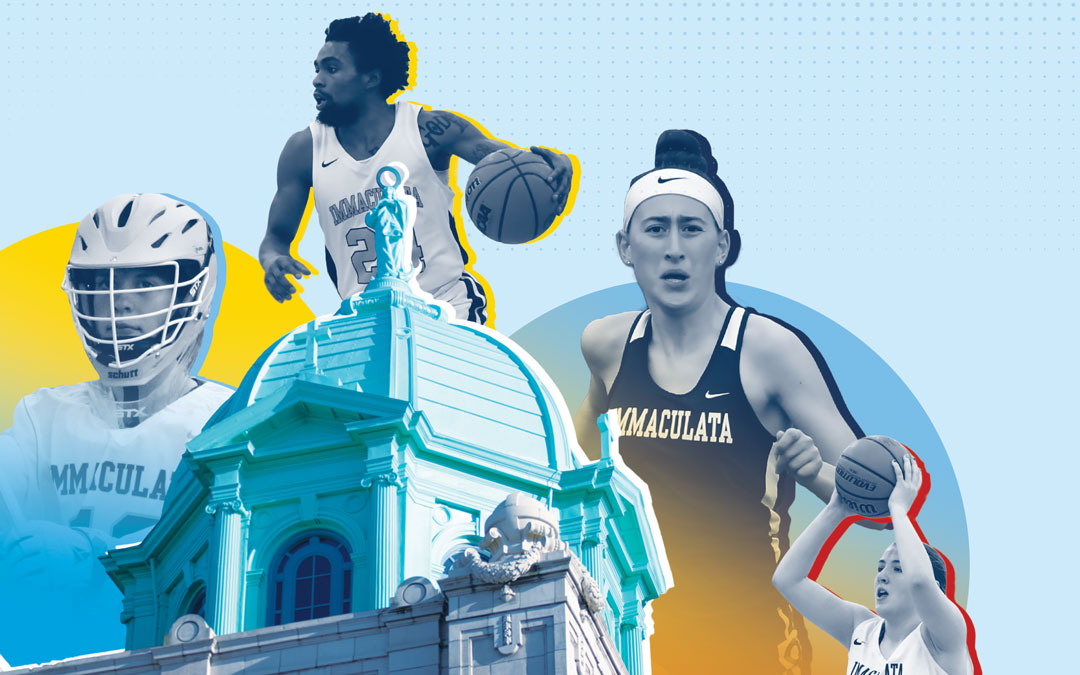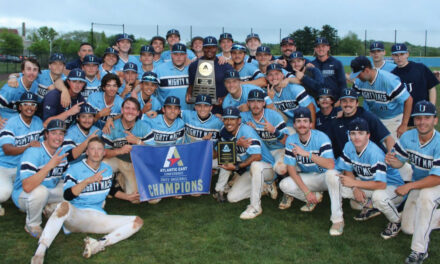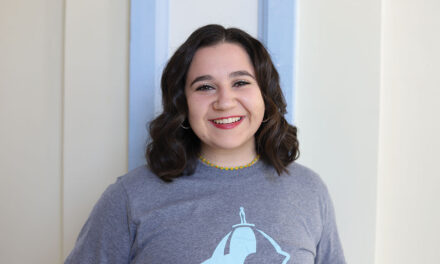Brains versus brawn. Why does it have to be an “either/or” scenario?
With nearly 35% of traditional-aged full-time students playing sports, Immaculata is proud that the cumulative GPA for all 22 sports teams is 3.30. Seventy percent of student-athletes made the dean’s list, which requires a GPA of 3.7 or higher.
Women’s soccer player Tanis McDonnell ’23 is a biology major with a minor in chemistry. As the captain of the team, she spends approximately seven to nine hours per week practicing and plays two games per week when in-season. Because both athletics and academics are important to her, she plans out her week ahead of time—checking the syllabi for exams and quizzes, so she can allocate more time to bigger assignments.
“I really love playing soccer, and I love biology, so being able to succeed in both my passions makes the long days and stress worth it,” McDonnell said.
Immaculata’s men’s and women’s swimming coach Kathleen Womelsdorf is the liaison between the athletic and academic departments. In this role, she monitors Starfish, an early alert software program that enhances the feedback students receive about their academic performance, and she meets regularly throughout the semester with the academic advisement team to discuss any concerns and updates related to student-athletes. She then shares this information with the various coaches.
To help athletes succeed in the classroom, the athletic department, and often individual coaches, provide study hall time. Womelsdorf, who oversees the study halls, states, “Having a time set aside to complete class work and to study is crucial for student-athletes’ schedules, considering they balance a lot of tasks, especially when in-season.” She praises the coaches for their commitment to high academic standards.
Womelsdorf’s main focus is to assist student-athletes in their transition to college and to help them better understand the academic and athletic demands they will encounter. She also suggests resources to the athletes such as peer and teammate tutoring, university tutoring and the writing and math centers.
Immaculata student-athletes are encouraged and supported in their pursuit of personal, academic, career and athletic goals. The athletic staff and coaches encourage the players to be actively involved in their educational process, so students balance their athletic and academic achievements.
“We reinforce that communication is key between the student-athlete and professors,” Womelsdorf says. “Student-athletes are reminded of how to write a professional email and how to address their concerns in a mature and confident manner.”
To support students after their playing days are over, Immaculata held a student-athlete career workshop, presented by Dustin Miller, assistant director of career counseling. As a former college athlete, Miller demonstrated how to use the status of being a student-athlete to attract potential employers and to enhance career options. Many employers seek out student-athletes because they recognize the advantages that they bring to a job, such as teamwork, discipline and the ability to deal with adversity. He explained the steps student-athletes can take to ensure they are prepared for a long career. Miller advised them to talk to professionals in their chosen field to explore what their job entails and to develop professional connections. During his workshop, Miller emphasized the importance of networking and securing internships. He also encouraged student-athletes to use their sports knowledge to engage in conversations. “This can serve as a commonality when beginning conversations pertaining to gaining experiences. People need to evaluate their true passion,” Miller states.
Julia Darlak ’24, a nursing major and member of the indoor/outdoor track and field team, emphasizes time management so that she doesn’t procrastinate and instead completes her class assignments the day before. Darlak admits that to keep up with classes, she has to make sacrifices with her free time.
“All of the sacrifices are worth it if it means that I do well in academics and athletics,” she says.
Jacob Fitzgerald ’22 is a great example of a student-athlete who is able to excel in both academics and athletics. The criminology major recently presented his research, “Chronic Diseases and Depression: Socioeconomic Impact on Communities in Poverty,” while also serving as the captain of the men’s soccer team, a position he’s held since his sophomore year.
The intangibles of leading a team are invaluable. Fitzgerald stated, “My experience as a captain was more than I could have asked for and being able to help my team and others on and off the field was a true honor.” One reason he chose to attend Immaculata was that he could focus on his athletics along with pursuing his bachelor’s degree, which was always his priority.
“Student-athlete” isn’t an either/or label at Immaculata. Students don’t need to choose brains over brawn.







